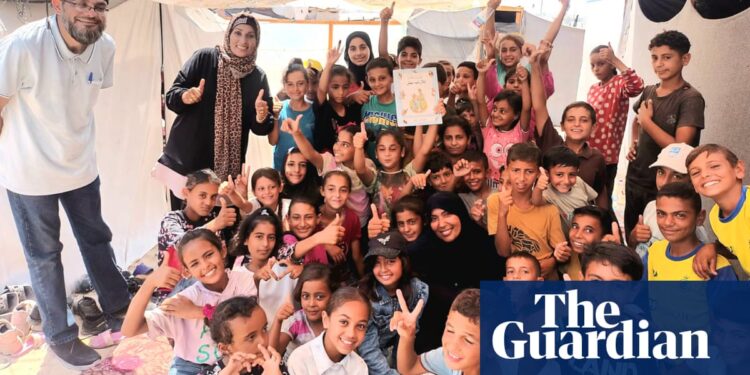Every evening, for two hours, Asma Mustafa sits down with the small children of Nuseirat camp in central Gaza for what now passes as school in the beleaguered strip. She makes do with what is available: sometimes there are pens and paper for basic maths and literacy, but most of the time class time is taken up with storytelling, singing and play.
“I have been doing this since November,” said Mustafa, 38, who taught at a girl’s high school in Gaza City before the war. “Many children are now working or helping their families find basic things like food during the day, but I try to give them a little bit of structure and normality in the evenings.”
Last week was supposed to mark the beginning of the new school year in Palestine, but in Gaza 625,000 school-age children are now entering a second year in which they have been denied the right to education because of the Israel-Hamas war. More than 45,000 six-year-olds were due to start school this year.
In the 11 months since Hamas’s 7 October attack on Israel, almost all of Gaza’s population of 2.3 million have been displaced from their homes, and some of the strip’s schools have become shelters – but about 90% of Gaza’s 307 public school buildings and all 12 universities have been damaged or destroyed in Israeli attacks, according to the Education Cluster, a collection of aid groups led by Unicef and Save the Children.
“Education has totally stopped since 7 October and the future is still unclear,” Mustafa said. “There’s no vision for how we start again because we are still under attack. Everything and everyone is targeted – the tents, the shelters, the schools, the streets. It’s a very dangerous situation.”
According to the health ministry in the Hamas-run territory, whose data various investigations and the World Health Organization have found to be broadly accurate, 25,000 school-age children have been killed or injured in the war.
For those who are clinging on, daily life has become a nightmarish struggle. There is no reliable data but it appears that many children have been put to work, collecting firewood or building makeshift shelters and gravestones. Younger children are sent to queue for hours at water and food distribution stations.
Yara al-Shawa, 22, from Gaza City, found out last September she had won a full scholarship towards a master’s programme in human rights law in Qatar. Unable to leave the strip because of the Israeli blockade, she and her school-age siblings now spend morning to night trying to keep their family alive and well.
“My younger brother now takes on responsibilities that no child should bear – gathering supplies, fetching water, tending to our household needs. School is a distant memory for him now. He’s been forced to grow up too fast under these circumstances,” she said of 15-year-old Ayman.
“I’m always struck by how much he has changed. He’s not little any more,” she added. “The war has stolen our future. What once seemed like achievable dreams – me becoming a lawyer, my brother finishing school – now feel like fantasies.”
Studies show that the more school time children miss, the more difficult it is to catch up on lost learning, and the less likely they are to return. Younger children’s cognitive, social and emotional development suffers; girls are more likely to be married off at younger ages, and boys forced into work or militancy.
Small-scale initiatives to keep children learning and engaged are present all over Gaza, and last month Unrwa, the UN agency for Palestinian refugees, managed to launch a “back to learning” programme in 45 shelters across the strip, which includes games, drama, arts, music and sports activities to try to mitigate the war’s impact on children’s mental health.
For Mustafa, the teacher in Nuseirat, the Unrwa programme is welcome but highlights how much more needs to be done. “There is only so much local or international organisations can do when sometimes five notebooks cost $50,” she said. “There is nowhere safe, schools and shelters are targeted. These challenges can’t be solved except by ending the war.”
For now, as internationally mediated talks founder once again, no ceasefire that could help restore normality is on the horizon. Like so many in Gaza, Mustafa has little choice but to cling to the hope that the war will end soon and the children of Gaza will be able to go back to a more normal life.
“The kids of Gaza are the future. They give me hope,” she said. “They give me the power to keep standing, to keep going.”







